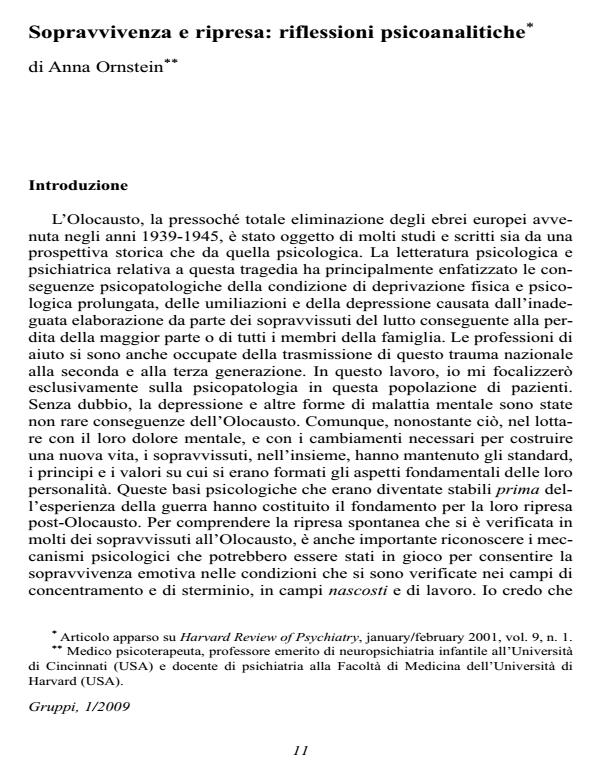Sopravvivenza e ripresa: riflessioni psicoanalitiche
Journal title GRUPPI
Author/s Anna Ornstein
Publishing Year 2009 Issue 2009/1
Language Italian Pages 20 P. 11-30 File size 126 KB
DOI 10.3280/GRU2009-001002
DOI is like a bar code for intellectual property: to have more infomation
click here
Below, you can see the article first page
If you want to buy this article in PDF format, you can do it, following the instructions to buy download credits

FrancoAngeli is member of Publishers International Linking Association, Inc (PILA), a not-for-profit association which run the CrossRef service enabling links to and from online scholarly content.
Survival and Recovery: Psychoanalytic Reflections - In response to a concern that the impact of the Holocaust will not be recognized by psychotherapists treating survivors, several psychoanalysts who were refugees from Nazi Germany devoted a great deal of time and effort to detailing the psychopathological consequences of the Holocaust trauma. Considering the magnitude of the trauma, it was not difficult to find evidence of psychopathology. However, because of their almost exclusive emphasis on psychopathology, most of these researchers failed to recognize the particular manner in which survivors mourned their enormous losses and made an effort to integrate their painful memories into the rest of their personality. This meant the loss of an opportunity to learn about the process of recovery following severe traumatization. The paper also described a hypothesis regarding the psychological mechanisms involved in adaptations to extreme conditions. From the author’s point of view, this constituted a link in the survivors’ effort to establish psychic continuity between their pre-Holocaust psychological organization and adaptations to a new life. Unlike her colleagues, the author believes that integration of traumatic memories was possible as long as the survivors encountered an empathic listening perspective and their effort to recover was validated. Survivors of trauma have every reason to expect that their stories will evoke fear, confusion, horror and disbelief and that therapists will protect themselves from these affects by resorting to generalizations or praise for the survivor’s heroism or special qualities. Such responses however make it impossible for survivors to proceed, and the affects associated with the traumatic memory may never, or only partially, enter the therapeutic dialogue. Once recovered and articulated, the memories are accompanied by grief and anger, indicating that an increase in self-cohesion, a healing of the vertical split, has allowed the previously feared affects to enter consciousness. From the author’s viewpoint, feeling anger is an expectable and healthy response in this context. Justified anger is not to be confused with chronic narcissistic rage, which can constitute the nucleus of severe personality disorders.
Key words: Holocaust, trauma, traumatic memories, adaptation, integration, empathic listening.
Parole chiave: Olocausto, trauma, ricordi traumatici, adattamento, integrazione, ascolto empatico.
Anna Ornstein, Sopravvivenza e ripresa: riflessioni psicoanalitiche in "GRUPPI" 1/2009, pp 11-30, DOI: 10.3280/GRU2009-001002